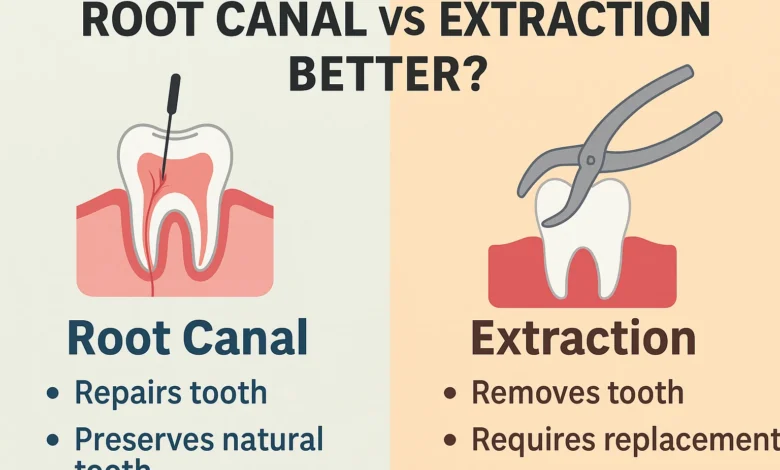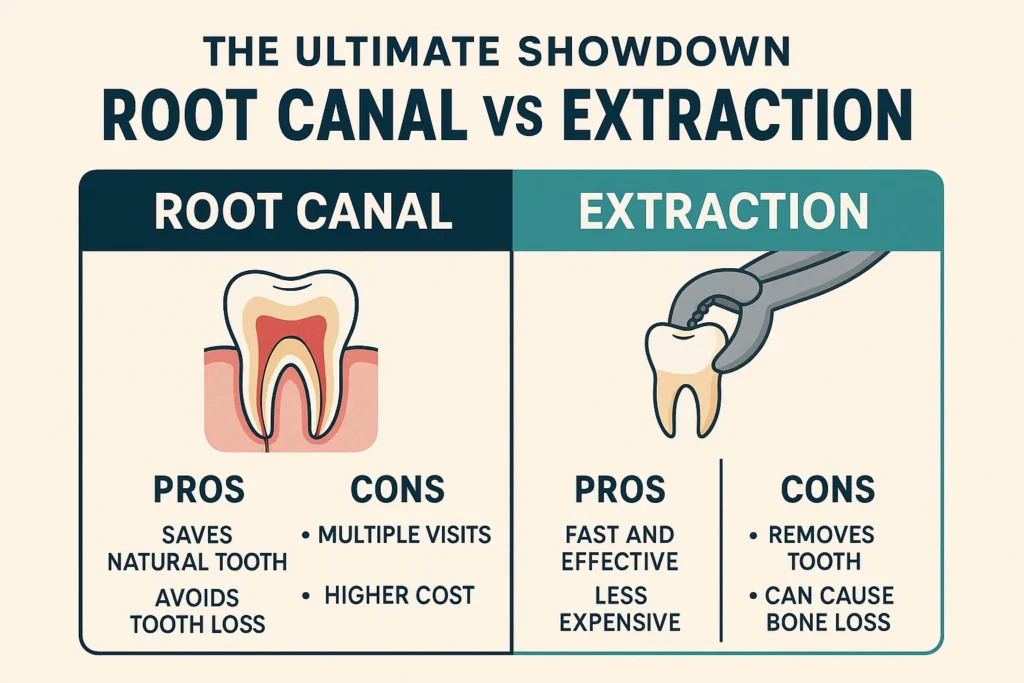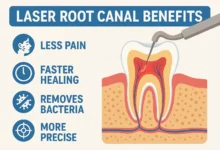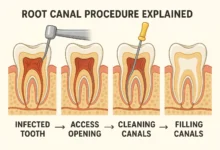Root Canal vs Extraction Better: Which Option Is Right for You

Root Canal vs Extraction Better: Which is Truly Better for Your Tooth?
So, which is the better option? The absolute solution supported by decades of clinical evidence is that root canal treatment of your natural tooth is nearly always the treatment of choice. But the world is not lacking in shades. This ultimate guide will break the fog, dispel the myths, and help you to have the confidence to talk with your dentist like an expert.
Understanding the Battle: What Are These Procedures?
Before we dive into the comparison, let’s clearly define what each procedure entails.
What is a Root Canal (Endodontic Treatment)?
A root canal is not a cause for dread; it’s a tooth-saving procedure. Think of it as a precision rescue mission for a tooth that is infected or irreversibly inflamed. The process involves:
- Delay: A tiny hole is created in the crown of the tooth.
- Cleaning: The small, complex canals within the roots of the tooth are carefully cleaned, disinfected and molded.
- Filling: These empty canals are filled with a non-toxic substance that is known as gutta-percha.
- Restoration: This is followed by the sealing up of the tooth using a crown which restores the functionality and strength of the tooth.
The aim of this procedure is to remove pain by destroying the tissue of the infected nerve and blood vessel (the pulp) and retaining the structure of the tooth in your jaw.
What is a Tooth Extraction?
An extraction is, in simple terms, the loss of the whole tooth along with the socket in the jawbone. It is a tooth-replacement material. Although it does certainly eliminate the issue of infection killing the source, it introduces a new issue, the fact that the tooth was killed. This usually requires an additional judgment of how to replace the lost tooth to avoid future complication.
The Ultimate Showdown: Root Canal vs Extraction Pros and Cons

This comparison table breaks down the core factors in the root canal vs extraction debate.
| Factor | Root Canal Therapy | Tooth Extraction |
|---|---|---|
| Primary Goal | Save and preserve your natural tooth. | Remove the problematic tooth entirely. |
| Tooth Survival | Your natural tooth remains, maintaining jawbone structure. | Tooth is lost, leading to potential bone loss over time. |
| Initial Cost | Often higher upfront (procedure + crown). | Lower upfront cost. |
| Long-Term Cost & Treatment | One-time procedure; no further work needed if crowned properly. | Often requires an implant, bridge, or denture (additional cost and procedures). |
| Procedure Time | Typically 1-2 appointments. | Usually one short appointment. |
| Recovery & Aftercare | Mild soreness for a few days; then normal function. | Several days of healing for the socket; possible diet restrictions. |
| Impact on Adjacent Teeth | None; neighboring teeth remain untouched. | Adjacent teeth can shift, tilt, or become loose. |
| Bite & Chewing Function | Normal bite and function are restored with a crown. | Can affect chewing efficiency, especially for back molars. |
Debunking the Myths: Pain, Cost, and “Reddit” Opinions
Myth 1: “Is a Root Canal or Extraction More Painful?”
It is the most widespread myth. The fact is that nowadays root canal treatment is not more painful than a filling. People get used to the excruciating pain they perceive when they have root canals, but they actually experience suffering in the form of the infection prior to the treatment. The surgery is done under local anesthesia and is meant to alleviate that pain. In extraction, the process is painless but the recovery after the operation may be more painful because the socket is healing.
Myth 2: “Is a Root Canal, or Extraction More Costly?
It is a mistake to examine only the first bill. Although a root canal vs extraction cost analysis indicates more initial money spent on the root canal and crown, extraction may be the first step on a very costly road.
Extraction-Only Cost: $150 – $400 (simple).
Root Canal + Crown Cost: $1,000 – $2,000+ (depending on the tooth).
Tooth Replacement Cost (after extraction):
– Dental Implant + Crown: $3,000 – $6,000+
– Dental Bridge: $2,000 – $5,000
As the data shows, extracting a tooth and replacing it with an implant—the gold standard—is almost always more expensive than saving the tooth with a root canal in the first place.
Myth 3: “Just Pull It, It’s Easier.”
This is a perilous reductionism. Extraction may appear to be a faster solution, but it is a lasting one. Removal of a tooth triggers a reaction. The teeth that are adjacent may move over to fill the gap and interfere with your bite. The opposite tooth is able to supra-erupt (over-grow). Most importantly, the jawbone in that region is starting to shrink or resorb as it is not stimulated which over time can change the shape of your face.
Pro Tip: Avoid basing your decision on anecdotal stories found on forums such as Reddit. Although the threads related to root canal / extraction Reddit can give you first-hand experience, they do not replace a physical examination and diagnosis by a qualified dental professional. Every case is unique.
When is a Root Canal the Unquestionable Winner?
Research consistently shows that preserving a natural tooth offers unparalleled benefits. A root canal is strongly recommended when:
- The tooth structure is mostly intact and restorable.
- The infection is localized to the tooth and does not extend into the bone around the tooth in such a manner that it would impede healing.
- You have a broken tooth which has not broken through to the root.
- It is an important strategic tooth in your bite, such as a back molar to chew with.
- You do not want to bear the long-term cost and effects of a lost tooth.
When Might a Tooth Extraction Be the Necessary Choice?
Despite the clear advantages of saving a tooth, extraction is sometimes the only viable or prudent option. This includes cases where:
- There is intense damage or decay of the tooth that extends to deep below the gum line, thus non-restorable.
- It has a vertical root fracture (a crack down the length of the root).
- It has severe periodontal (gum) disease which has caused the bone which holds tooth to be destroyed.
- The tooth belongs to a congested dentition and is extracted on orthodontic indications.
- Root canal is really expensive and the less desirable yet useful alternative is a partial denture, which is affordable.
Your 5-Step Action Plan for Making the Right Choice
Feeling overwhelmed? Follow this expert-guided plan to navigate your decision with confidence.
- Get a Clean Diagnosis: Have your dentist order a digital x-ray or 3D CBCT scan to understand the true state of the tooth, the depth of infection, and the health of the bone.
- Ask the Right Questions: The correct question to ask in your consultation is: Is my tooth restorable? What is the long-term prognosis of a root canal vs. an extraction and an implant in this case? What are the total costs of all the associated costs of each path?
- Get a Second Opinion: In such a big decision it is a good idea to get a second opinion with a specialist in endodontics (root canals) that is called an endodontist. They are specialists at tooth-saving and can at times deal with complicated cases that may be beyond the reach of general dentists.
- Think in the Long View: Think beyond next week. Ask yourself how you will have oral health in the next 10, 20 or 30 years. Saving your natural tooth is nearly always a long term health investment.
Get a detailed written treatment plan and an estimate of the cost of the path of the root canal and the complete extraction-and-replacement path: To make an informed choice about the treatment, a detailed written treatment plan and cost estimate must be obtained. Compare the real long-term financial impact.
Frequently Asked Questions (FAQ)
Key Takeaway: Your Natural Tooth is Priceless
As a clinical standpoint, the root canal vs extraction debate is an obvious winner: preserving the tooth. Although sometimes it is impossible to avoid extraction, your natural tooth is a biological wonder that cannot be fully recreated by implant. It looks the most natural, keeps your jawbone and gives your smile its proper balance.
Your Next Step: Don’t make a decision based on fear or a lack of information. Make an appointment with a reliable dentist/endodontist. Talk to us about your unique situation, have both alternatives properly prognosed, and invest in the long-term health of your smile. You will be glad you did.
Hollywood Smile Cost USA 2025 – Is It Worth It?



